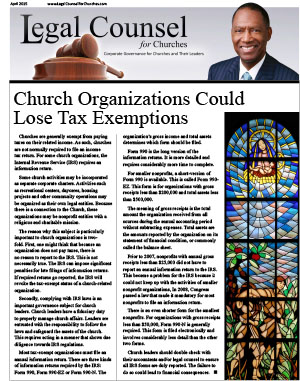One might find it unimaginable that someone would cheat a church. After all, churches stand for doing the right thing. The reality is churches are as vulnerable to scam artists as other organizations.
I have written on this subject before. I bring it up again because recently I’ve been asked to evaluate a number of potentially bogus offers. In every case, the offers were indeed fraudulent. I have found common elements to most of these claims. Here are a few tipoffs to watch for.
Unsolicited Message
Most swindles begin with the bad guys seeking out victims. In some cases, the scam begins with an unsolicited email or letter in the mail. The communication may recite some information about the church and its officials to pretend familiarity. Don’t be fooled that the sender knows names, positions and the church address. Some of this information can be easily obtained on-line from the church’s web site.
Some of the emails I have seen come from overseas senders. The spelling is often careless and the wording awkward. One can be forgiven of the occasional typo. However, when persons who hold themselves out to be professionals don’t communicate that way, there may be a reason for pause.
Sense of Urgency
For rip-offs to work, the swindler must catch the victim off guard. This includes completing the transaction before the victim realized something is amiss. So, most offers will come with an urgency to act fast. There may be a deadline to make a quick decision. The details that come with the story may state that the opportunity is limited or the person in need is in a big hurry. A real warning is a request from the other party to wire money to them before the check that was received has had an opportunity to clear the banking system.
When church leaders make decisions with the church’s funds, they have a duty to be vigilant. Transactions with strangers should only go forward when the church has absolute comfort with all the parties and underlying details. If the church is being hurried to make a fast decision, this is a red flag.
Unbelievable Benefit
There is an old saying. When something sounds too good to be true… well we all know the rest. When I’ve been asked to review a sting that has fleeced someone, I noticed that the promised benefit was outrageous. There was an unreasonably high profit, large windfall, or lucrative gain to be had. Con artists know that such promises appeal to one’s longing to be suddenly blessed. These claims are meant to exploit its victims in an emotional way. With emotions in the way, normally prudent people forget to ask questions.
Church officials should have an idea of what ought to be expected in such a transaction. Any gains above the reasonable level should be looked to with heightened scrutiny. This does not be mean that windfalls never happen. Undeniably they do. It’s just when the other party is anxious to convey a benefit without a logical reason for doing so, some suspicions should arise.
Verification is Difficult
When a check arrives unexpectedly or a deal is proposed from a stranger, check out the other party. A background check may reveal if the parties are legitimate. Look for instances where a party has been involved in litigation with other clients or counterparties. This history may help one understand the party’s previous course of dealings.
If someone is a trickster, the party may avoid divulging information
about their background or giving a list of references. Remember
the point about the sense of urgency? If the church starts asking
questions about the source of funds and insisting on guarantees
before making an exchange, the dishonest person will likely abandon
the deal before the truth comes to light.
In conclusion, churches run the risk of being misled as much as any business, association or organization. It is important to examine each transaction carefully before acting on an agreement. It is especially wise to make sure an arrangement is not a con before it’s too late.

